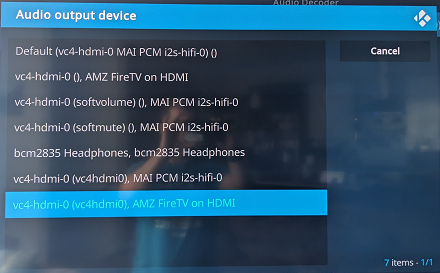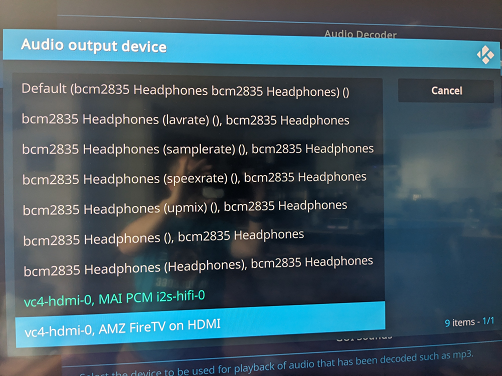bullseye 64 bit support
-
@mitu It looks that something i did wrong when i try to create the folders. I try again and now the sound is working.
I did exactly :
sudo mkdir /etc/alsasudo mkdir /etc/alsa/conf.d- I set from RetroPie menu audio to
HDMI 0 - Restart EmulatioStation
After tha sound is working, the only thing that remains is the message about mixer.
Many thanks mitu!
-
@windg said in bullseye 64 bit support:
@mitu It looks that something i did wrong when i try to create the folders. I try again and now the sound is working.
Thanks for the confirmation, I'll take a look at why the folder is missing and maybe create it automatically, will need to start from a clean image again since my bullseye image has suffered many changes and was installed from an earlier RaspiOS version.
Ideally we can also make HDMI the default audio output on a fresh image, since the analog audio is now the default.
-
Hey all, thanks for the support. I know that this is a grey zone but it's much appreciated. My bad in conflating Bullseye support with 64 bit support.
I was having issues with audio as well, even before installing RetroPie (speaker-test failing with error 524, could not add HDMI via mixer or emulation station). The only way I was able to fix it was to move to fkms from kms (the default) in config.txt.
It seems very similar to this thread: https://retropie.org.uk/forum/topic/32888/amiberry-audio-not-working-on-bullseye-64-bit-pi4-kms
After installing RetroPie the setup script was complaining about ALSA configuration and I ended up removing it this morning, and things are working now.
-
@ParadoxGBB Did you try the above instructions for the sound issue?
I believe they are the same for the 64 bit version. I confirm that the sound is working if you follow above steps that mitu suggest.In any case, support for Bullseye is still under development and not ready to be used as a stable system.
-
Thanks again all for the support --- I updated the script today (thanks for that update), reverted back to the default kms in config.txt, and selected HDMI 0 and it works!
Mostly --- Everything but Kodi seems to be happy. I went into the audio settings in there and tried a few options but it's not working yet. I tried reinstalling Kodi as well just in case.

I'm probably missing something basic here since Kodi actually sees the TV device --- not currently using passthrough.
Thanks again for the help.
-
@ParadoxGBB Ach, Kodi.. Haven't tested it yet just with ALSA, it may need PulseAudio/PipeWire installed.
EDIT: try using the 'vc4-hdmi-0 (softvolume)' device and see if that produces any sound.
-
@mitu Thanks a ton.
No dice, unfortunately. I tried both soft drivers, and tried cycling Kodi between each try.
What specific packages do you suggest, one or both? Just an apt get install pulseaudio?
I can afford to be rather cavalier here, I imaged my current SD state before trying this, I always work with backups.
-
What specific packages do you suggest, one or both? Just an apt get install pulseaudio?
PipeWire is still a bit unstable on bullseye, try installing pulseaudio.
EDIT: you may have to 'reset' your Audio config after installing pulseaudio, since it will take over ALSA and the existing configuration may not work for emulators/ES.
-
@mitu So thankful for your time.
Yup, installed, rebooted, set new audio device in RetroPie audio, still so far no dice on Kodi, list is now:

I'm starting to better understand now (with this and a few things I'm also looking into) why supporting Bullseye isn't so straightforward yet. ;-)
EDIT: Tried the last two options in case that wasn't clear.
-
Tried pipewire as well, still not successful
-
I have sound with Kodi 19, navigations sounds and h264 movie. I did a manual installation on top of Bullseye 32bit lite. I didn't install desktop or other audio drivers.
The only "issue" i find is that it didn't recognize the gamepad and ask me to configure it. -
Happy to report that I figured it out --- the settings I had in Kodi were carried over from my previous install, and it had "Stereo upmix" enabled. Disabling that setting got me working, no additional packages like PulseAudio or PipeWire needed.
Thanks everyone for the help --- I'm going to pay it forward with a few notes of some of the other bumps I hit when I get everything working.
-
I know, no 64 bit image, based on Bullseye, will be official released. If it is possible for BuZz to offer binary files for scummvm and lr-scummvm that need a lot of time to be build in the Pi? Thanks.
Contributions to the project are always appreciated, so if you would like to support us with a donation you can do so here.
Hosting provided by Mythic-Beasts. See the Hosting Information page for more information.